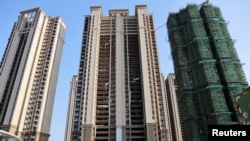Chinese authorities are promising to establish an initial rescue fund of $11.8 billion (80 billion yuan) to offset a looming crisis in the real estate sector, where homebuyers routinely purchase residences from developers' plans and begin making mortgage payments before the dwellings are finished.
By having customers purchase homes "off plan," builders can receive construction financing and shift risks — such as costly pandemic-related supply chain delays and bankrupt builders — to the middle-class homebuyers.
For many buyers, the risks seemed worth it. But then China's COVID-cooled economy strained many family budgets, and draconian lockdowns stalled work on residential projects. As home prices fell, some buyers found themselves paying mortgages on properties worth less than what they had agreed to pay. That was followed by the tightening policies in August 2020, when the central government realized real estate developers' debt was getting out of control.
Amid all this, many homebuyers announced they would stop making mortgage payments to banks until work resumed on unfinished projects.
Experts say the boycott is a byproduct of two decades of insufficient oversight over a red-hot real estate sector. One economist likened the situation to a Ponzi scheme, a type of fraud that pays existing investors with funds collected from new investors.
Reuters describes the promised rescue fund as the first step in creating a "war chest" of as much as $44 billion (300 billion yuan). The state hopes the effort, announced Sunday, will not only help property developers resolve a debt crisis but also restore confidence in the real estate sector.
A state bank official who declined to be named due to the sensitivity of the matter told Reuters that the fund would initially be set at 80 billion yuan through People's Bank of China and China Construction Bank.
High risks, low supervision
Mr. Fang, a real estate developer in China and the United States who asked that VOA Mandarin not use his real name for fear of reprisal, said while U.S. banks supervise and control loans issued to off-plan property developers from groundbreaking to occupancy, Chinese banks offer less supervision.
According to China's presale housing regulation, funds received from sales of homes must be used to build them, a process supervised by the Ministry of Housing and Urban-Rural Development and banks.
In practice, however, poor supervision is common, according to Fang.
In this environment, Chinese developers "want to take big risks," Fang said.
Instead of putting buyers' mortgage payments toward construction of their homes, Fang said, Chinese developers buy more property.
With the economy and housing market cooling off, it is "basically suicidal" to buy more land on the assumption that developing it will pay for finishing construction underway elsewhere, Fang said.
'A bit like a Ponzi scheme'
An economist in China, who requested anonymity due to fear of reprisal, told VOA Mandarin that real estate companies have never been regulated.
"When the economy is good, with the continuous expansion, most of the properties can be delivered. But when the economy is not good, it becomes a bit like a Ponzi scheme. If there is no follow-up funding, they will not able to complete construction," she said.
A Chinese banking regulator said on July 21 that it will coordinate support to property developers in need of loans after homebuyers stopped making mortgage payments, usually putting the money into escrow accounts instead.
At a press conference in Beijing last Thursday, Liu Zhongrui, director of the Statistical Information and Risk Monitoring Department of the China Banking and Insurance Regulatory Commission (CBIRC), said that banks and other government departments will meet reasonable financing needs of real estate developers. But he did not give details.
"We actively strengthen the coordination and cooperation with the Ministry of Housing and Urban-Rural Development, the People's Bank of China and other departments, and support local governments to more effectively promote the work of 'guaranteeing the delivery of buildings, protecting people's livelihood, and maintaining stability,'" Liu said.
The earliest "mortgage boycott notice" by more than 5,000 homebuyers appeared in April 2021 in Taiyuan, in the northern province of Shanxi, after a local developer's project languished unfinished for more than two years.
Letters to banks
Last month, homeowners in Jingdezhen, in northeastern Jiangxi province, sent a letter to their banks announcing they were suspending mortgage payments because of the delayed delivery of residential units purchased off plan. Since then, homeowners of more than 300 unfinished residential projects nationwide have sent similar public letters to banks.
Last week, some 200 frustrated home buyers in Wuhan demonstrated outside a bank regulator's office, according to an article in The Wall Street Journal.
It's unclear how many homebuyers are involved in the protests because Chinese censors are clamping down on news of mortgage boycotts, Reuters reported.
A study, the "2022 National Unfinished Building Research Report," published July 18 by the Shanghai-based E-House China Research and Development Institution, a think tank that analyzes the real estate market, found that 54% of homeowners who issued mortgage suspension notices came from the central China province of Henan, home to a billion-dollar banking scandal.
According to the report, the value of mortgage loans involving unfinished buildings nationwide was $133.2 billion (900 billion yuan) in the first half of 2022, accounting for 1.7% of the national mortgage balance.
"This industry is a mess, and no one used this kind of quantitative analysis to analyze it before," Yan Yuejin, the report's author and the think tank's director of research, told VOA Mandarin.
Although 1.7% does not sound high, it is already very high and poses a serious risk for banks, Yan said. "The banks' tolerance rate for this [kind of] nonperforming loan … should not exceed 1%."






